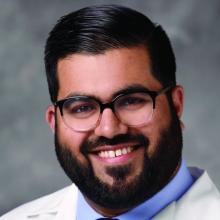What started as an attempt to standardize care for acute myocardial infarction with cardiogenic shock at a handful of Detroit-area hospitals has led to markedly better survival rates than the traditional flip of a coin, in a nationwide analysis.
Final results from the National Cardiogenic Shock Initiative (NCSI) show 71% of patients survived to discharge and 68% were alive at 30 days.
Patients presenting in stage C or D shock, who comprised the bulk of patients in previous trials, had survival rates of 79% and 77%, respectively.
Among stage E patients, who are in extremis and have typical survival rates of less than 20%, survival was 54% at discharge and 49% at 30 days, co–principal investigator Babar Basir, DO, Henry Ford Hospital, Detroit, reported at the Society for Cardiovascular Angiography and Interventions (SCAI) annual scientific sessions, held virtually.
“This is the first push to really be able to consistently get survival rates over 50%, particularly in those patients who presented in stage C and D shock,” he said. “Really, it’s important to emphasize here the hard work it’s taken to get to this point and all the research that’s been done.”
The NCSI protocol emphasizes rapid identification and support of cardiogenic shock (door to support time <90 minutes), early placement of the Impella (Abiomed) ventricular assist device prior to percutaneous coronary intervention (PCI), and right heart monitoring to reduce the use of inotropes and vasopressors.
Co–principal investigator William O’Neill, MD, also from Henry Ford, previously reported results from the pilot study showing 84% of 30 patients survived to discharge.
The present analysis was based on outcomes of 406 consecutive acute MI patients (mean age, 63.7 years; 24% female) who presented with cardiogenic shock at 32 academic and 48 community hospitals in 29 states and the District of Columbia.
Dr. Basir emphasized that this is the largest prospective North American acute MI cardiogenic shock study in 20 years and recruited “one of the sickest cohorts ever studied.” The average blood pressure among the patients was 77/50 mm Hg; 77% had a lactate of at least 2 mmol/L (mean, 4.8 mmol/L), and 25% were in stage E shock.
One-quarter of patients were transferred from other institutions, 82% presented with ST-segment elevation MI, two-thirds had multivessel disease, and 13% had a left main culprit lesion.
Right heart catheterization was used in 90% of patients, an Impella CP device in 92%, an Impella 2.5 device in 5%, femoral access PCI in 78%, and aspiration thrombectomy in a full 27%.
Despite this sick cohort, survival at 30 days was better than in any previous study of cardiogenic shock, Dr. Basir said. In comparison, 30-day survival rates were 53%, 60%, and 49% in the SHOCK, IABP SHOCK, and CULPRIT SHOCK trials, respectively.
That said, survival over the course of the first year fell to 53% in the entire cohort, 62% in patients with stage C or D shock, and 31% in those in stage E shock.
“One-year mortality continues to be a problem for these patients and emphasizes the need for goal-directed medical therapy, early advanced heart failure follow-up, and novel therapies such as what we are planning with the evaluation of [supersaturated oxygen] SSO2 to reduce infarct sizes in the ISO-SHOCK trial,” set to begin later this year, Dr. Basir said.
Given the promising results in the NCSI, the randomized controlled RECOVER IV trial is planned to begin in 2022, he noted. It will assess whether Impella pre-PCI is superior to PCI without Impella in patients with inclusion criteria similar to that of the NCSI. The DanGer Shock randomized trial is ongoing in Denmark and Germany and assessing all-cause mortality at 6 months with the Impella CP device compared with standard of care.
“We hypothesize that greater utilization of this protocol, and refinement of the escalation strategies will consistently lead to a survival rate greater than 80%,” Dr. Basir concluded.
Past SCAI president Kirk Garratt, MD, Christiana Care, Newark, Del., who moderated a press conference where the data were highlighted, noted that late complications led to a roughly 20% absolute mortality increase from discharge to 1 year, and questioned what percentage could be attributed to the mechanical support offered.
Dr. Basir said that information was not specifically tracked but that many patients presented with multiorgan failure and, irrespective of that, the majority died from ongoing heart failure.
During the formal presentation, panelist Ron Waksman, MD, MedStar Heart Institute, Washington, questioned whether results were different between academic and community centers, but also pointed to the lack of a comparator in the single-arm study.
“It’s very hard to do any comparison historically; we do need to have a control group,” he said. “If you would have opened it to any treatment at the time of the initiative, which is great, but not just limit it to use of the Impella devices, we would have better understanding if there is really a differentiation between one device versus the other devices.”
Dr. Basir replied, “I think that is a very reasonable comment and, in regard to your question, it is always difficult to differentiate between academic and community centers, but these were large community programs that have all of the technologies available in an academic center.”
NCIS is funded in part by unrestricted grants from Abiomed and Chiesi. Dr. Basir reported consulting for Abbott Vascular, Abiomed, Cardiovascular Systems, Chiesi, Procyrion, and Zoll.
A version of this article first appeared on Medscape.com.


